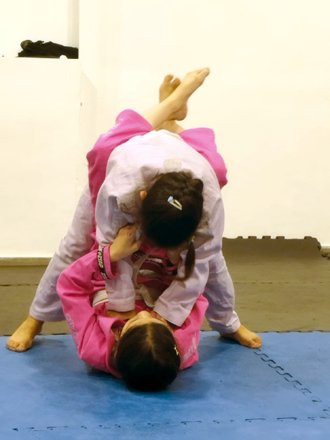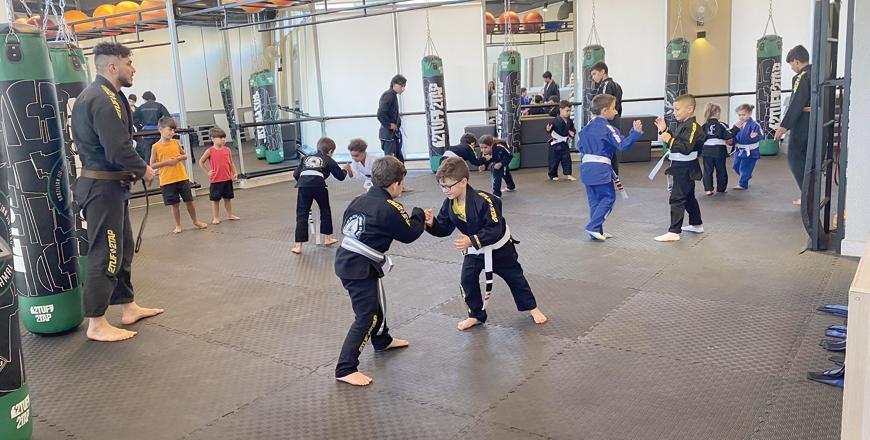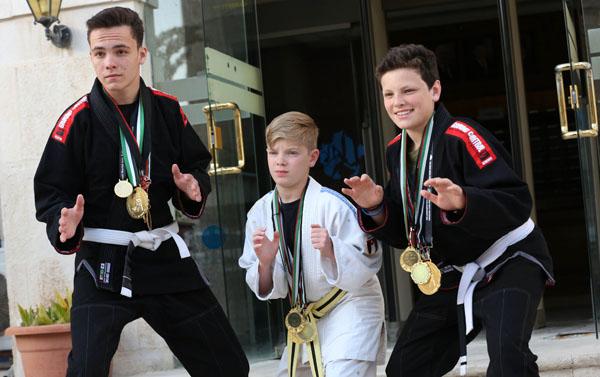You are here
Through martial arts, women develop more awareness about their rights, more courage to defend them – instructors
By Francesca Maria Lorenzini - Nov 26,2024 - Last updated at Nov 26,2024

The girls synchronise their movements as they repeat the steps, their bodies fluidly transitioning from one move to the next (Photo by Francesca Maria Lorenzini)
AMMAN — In a bustling Taekwondo studio in Hashemi Shamali, the sound of rhythmic thuds fills the air as a group of girls move in sync, executing precise kicks and punches.
Clad in their white uniforms, their faces are focused, determination in their eyes. At the front of the class, their trainer, Laith, stands with a commanding presence, his voice cutting through the silence.
“Raising, right, and raising, left!” he shouts, and the students quickly raise their legs high and perform swift, powerful strikes.
“Now, right, left, with me. Let's go!” Laith calls out, his tone firm. The girls synchronise their movements as they repeat the steps, their bodies fluidly transitioning from one move to the next. Each punch lands with a sharp snap, and every kick is executed with confidence.
In the background, the sound of feet hitting the mat and the instructor’s constant guidance create a rhythm that propels the group forward. The room buzzes with energy, a testament to the growing enthusiasm for martial arts among women in Jordan despite societal expectations.
Layan, a 15-year-old Jordanian Filipino and a blue belt in Taekwondo, a Korean combat sport involving punching and kicking techniques, has been training with Laith for nearly three years.
She is doing so through the support of Collateral Repair Project, a non-profit organisation that offers these classes at no cost. Her interest in martial arts was sparked in childhood, when she would watch martial arts movies. While her family, particularly her mother, has been very supportive in her choice, some of her friends weren't as encouraging.
“All of my friends think that I'm really weird,” Layan recalled. “They said ‘it’s not good for you. A girl should go to school and then go back home.’ But when they said that, I really didn’t care.”
Layan’s story reflects a growing trend among young girls in Jordan, who are becoming more interested in these kinds of discipline. In 2021, Lina Fayyad made history as the first Jordanian female mixed martial arts fighter to win the UAE Warriors Arabia championship.
Several initiatives, like SheFighter, the first self-defence academy for women in Jordan founded by Lina Khalifeh, have earned international acclaim, with figures such as former US President Barack Obama recognising its impact.
“By building confidence in women through self-defence training, they not only become more aware of their rights in society but also develop the courage to actively advocate for those rights,” Khalifeh said.
In the Jabal Al Hussein refugee camp, Beisan Al-Sharif is the director of the Orphan Child Welfare Association (OCWA), which offers Jiu-Jitsu classes to girls who lack strong parental support, alongside other initiatives. Al-Sharif’s journey into martial arts began eight years ago, when she started practising kickboxing as a way to channel her energy.
“The sound of punches on the bags, and the rhythm of it all, was therapeutic,” she said.
Growing up in a family where martial arts was a cornerstone—her family practised both Jiu-Jitsu and kickboxing—Al-Sharif had access to these disciplines. But her choice to pursue it has not always been well-received by those around her, who view this, along with her work in male-dominated fields like scuba diving and shipping, as unusual. Her response to these criticisms is straightforward: “Women are capable of doing anything and everything if they put their minds to it.”
Nearly six years ago, she launched the initiative to introduce Jiu-Jitsu, a Brazilian ground-based martial arts sport with roots tracing back to the Japanese Samurai culture, to refugee girls as she recognised the lack of safe, creative spaces for them. Since then, her vision has gained momentum, with the centre now having a waiting list. This growth reflects a shift in community attitudes, which initially opposed activities beyond the traditional educational programmes, as they were unfamiliar and, in part, due to OCWA being the first gender-mixed centre in the neighbourhood.
But for Al-Sharif, the impact of the initiative goes beyond just teaching self-defence.
“You can really see the impact on their [the girls] growth,” she said. “Not as shy anymore, they speak their minds.”
Rama Hussain, an instructor at the centre and former Jiu-Jitsu athlete, shares Al-Sharif’s belief.
“It’s great that every girl has a strong personality, whether it’s an internal one that she builds on her own, or an external one that she works on,” she said.
Growing up in a sports-oriented family, with her sister Razan as a runner, Hussain was encouraged to pursue physical activities from a young age. She began practising Jiu-Jitsu at age 11, and for her, sport was always part of the family fabric. While Hussain didn’t face personal resistance, she acknowledges the societal challenges women often face when pursuing martial arts in Jordan.
“Society has a role to play,” she reflected, recognising that cultural attitudes can limit women’s participation in sports like Jiu-Jitsu.
But both she and Al-Sharif remain hopeful about the future of these disciplines in Jordan.
“There is more exposure now, more acceptance,” Al-Sharif noted.
In her view, martial arts are increasingly recognised as a form of self-defence, which has helped make them more widely accepted. Lina Khalifeh, on the other hand, advocates for a culturally sensitive approach to promoting it.
“The focus should be on framing self-defence as a tool for personal growth, safety, and community empowerment rather than as a response to fear or conflict,” she said.
She also believes that involving men in the conversation—through workshops, discussions or inclusive training sessions—can help challenge stereotypes and foster an environment where self-defence is viewed as a universal right, not a divisive issue.
Taekwondo instructor Laith has played a role in this. With a three-decade-long career in the discipline, he began focusing on teaching girls during the COVID-19 pandemic by offering online classes. Today, he still conducts in-person sessions in Hashemi Shamali, and his impact extends well beyond the training mats.
“Taekwondo is for girls,” he said. “It strengthens their personalities, makes their thinking correct.”
He views the discipline as a way of life, not just a sport, and aims to pass this mindset on to the girls he trains, such as Layan.
“Jordanian people are starting to see that [Taekwondo] it’s something valuable for girls,” she said. “It gives them a brighter future.”
Related Articles
AMMAN — Jordanian jiu-jitsu black belt Samy Jamal is leading a social project to empower underprivileged children in Jordan through sports.J
Three ambitious brothers with a desire to be the best put their mind and all their effort into participating in the world’s biggest jiu-jitsu championship and ended up landing two gold medals as a result of their determination.
AMMAN — Jiu-Jitsu athletes took the lion’s share of recognition at the annual Black Iris Sports Awards at a special ceremony on Monday.Malek



















